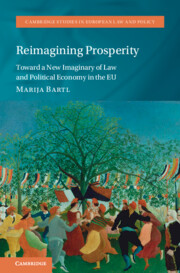The last decade has seen a revival of interest in the ideas or ‘constitutional imaginaries’ underlying the European Union (EU) and its law.Footnote 1 To give one example, the rule of law crisis has re-enforced a changing narrative, forwarded, for example, by the current President of the Court of Justice, that protecting fundamental values is at the core of Europe’s legal mission.Footnote 2 As a corollary, it has become less fashionable to see the functional goals of the internal market as the EU’s law core.
This book, by Marija Bartl, both rejects and embraces this change. On the one hand, it is firmly about the importance of understanding European integration in terms of markets and prosperity and their ability to contribute to the lives of Europeans. It thus fits with a line of research connecting EU law to changes in political economy.Footnote 3 On the other hand, it urges a fundamental rethink of how we imagine prosperity. In Bartl’s vision, the failure of privatised prosperity requires a new imaginary of prosperity, where democratic and collective institutions take greater control over economic goods and their distribution.
Such a reinvented shared vision for prosperity is important, so she argues, not just for economic reasons but because narratives of prosperity and of democracy co-constitute each other. There is, therefore, a connection between the neoliberal narrative of prosperity that has dominated the Union for the last decades and the erosion of trust in democratic institutions that has established a turn to tribal or populist imaginaries as its political shadow. Bartl’s book is thus fundamentally about how new ideas of the role of collective institutions in Europe’s economic order are vital in reversing patterns of democratic decay.
In addition to its overall conceptual argument, the book carries a close interest in economic institutions, historically reconstructing how core elements of EU law, from corporate governance to industrial policy, consumer protection, and the regulation of new technologies, are shaped by underlying ideas on how they contribute to prosperity. In every chapter, Bartl is not content to revisit past debates but also engages with how new EU initiatives – from the European Green Deal to regulation of the circular economy – slowly attempt to embed collective institutions in their vision of how prosperity in Europe can be realised. Readers can therefore both engage with the book’s overall argument and use it as a guide to understand how new collective goals are reshaping concrete areas of EU law and policy.
As a book that does not simply analyse EU law but makes compelling arguments about its future, Marija Bartl’s monograph is an important contribution to the field. We are delighted to welcome it to the Cambridge Studies in European Law and Policy series.
1 See, for example, Komarek (ed.), European Constitutional Imaginaries: Between Ideology and Utopia (Oxford University Press, 2023).
2 Lenaerts, ‘New Horizons for the Rule of Law within the EU’. German Law Journal 21.1 (2020): 29–34.
3 P. Kjaer (ed.) The Law of Political Economy: Transformation in the Function of Law (Cambridge University Press, 2020).

